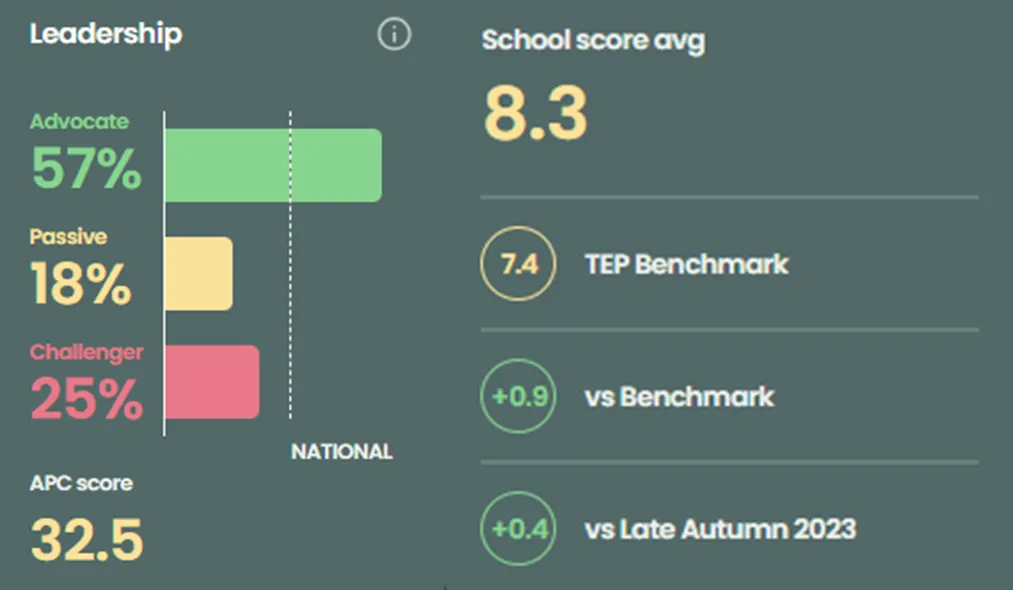.webp)
Key takeaways
- Strong positive behaviour at Sudbury stems from a culture of consistency and value modelling by leadership and the wider staff, with clarity around expectations and rigorous implementation of policies.
- Leaders at Sudbury use The Engagement Platform (TEP) to identify areas for improvement, highlighting the importance of comprehensive feedback for addressing various aspects of staff and student experience of school life.
- Sudbury is nimble; the adaptation of behaviour policies for different age groups, and the speed with which they address arising issues underscores the importance of tailoring strategies to suit the needs of students at various stages of development.
Introduction
I recently met with Kamini Mistry, headteacher, and Luke Webber, senior deputy headteacher (with responsibility for behaviour), to further explore their approach to managing behaviour at Sudbury Primary school in Wembley after consistently high TEP scores from their staff around their behaviour systems, ability to control disruptive behaviour and ability to develop productive relationships.
The leadership team at Sudbury have taken a keen interest in employee engagement for many years, beginning with annual in-house Microsoft Forms surveys for staff voice. They also use staff preference forms to identify where staff would like to see improvements and what they would like to develop in themselves.
Sudbury, as part of the Chrysalis Multi-academy Trust signed up to take part in TEP starting in Autumn 2023. They chose TEP because as Kamini explained, it covers “all areas across the school”, not just teaching and learning. Luke shared with me how they've also found the ability “to be able to make those comparisons [across the MAT] and having that national data [live benchmarking] as well, as a comparison, is a useful functionality of TEP”. They explained that, in the past, their previous surveys had been based primarily around teaching and learning and curriculum and they had found it harder to focus on support staff.
Behaviour at Sudbury Primary School
It was clear from our conversation that Kamini and Luke both take great pride in the behaviour at Sudbury Primary school, and it was mentioned that the manners and politeness of the children are regularly commented upon by external visitors, whether these are Ofsted inspectors or a group of visiting Norwegian delegates. Both Luke and Kamini were keen for others to visit the school to really experience this first hand.

Figure 1 clearly demonstrates the impact that the positive behaviour of the students has on the staff members, further backed up by the consistent scores above the TEP benchmark in the question breakdown in Table 1.
.webp)
Naturally, I was keen to dig deeper and identify the drivers behind this change. The school has been on a journey, after a ‘Requires Improvement’ judgement in 2015, Kamini began as a deputy head and took over the headship in 2019, and Luke has been at the school since starting as a newly qualified teacher 13 years ago. He was keen to emphasise that this change has not occurred overnight, and it is the result of years of hard work from all staff at the school.
The key theme that came out of our discussions around behaviour was consistency. This is something which is modelled day-in and day-out by Kamini, and Luke but also by every member of the staff. The procedures and strategies within the school are rigorous and robust, and training is regularly provided for staff, old and new. The leadership team constantly monitor behaviour and where necessary, review and adjust policies.
“We’ve been told that we make it look seamless and we make it look easy, obviously in the background there’s a lot going on. Luke, myself, and other senior leaders are consistently applying the policies and procedures. It hasn’t come easily but we make it look effortless and seamless”, Kamini shared with me.
As Luke explained, they are not doing anything ground-breaking – they have six, standard, school rules and five key values which are instilled amongst pupils, parents and carers, and staff, who are held to account to these, Figure 2.
.webp)
What is less standard perhaps, is they way in which leaders, and the wider staff body, instil these values, manage behaviour, and consistently strive for improvement, and this is what Luke attributes to their strong TEP scores.
Throughout the academic year, Sudbury’s values aren't just taught; they're lived. Integrated into every corner of the school, they're not only seen on posters but also ingrained in the curriculum. Each value has its own cartoon character, crafted by students during the Covid pandemic, serving as friendly reminders for positive behaviour. Recently, the Head Boys and Girls wrote creative stories about these mascots, and these are proudly displayed for all to enjoy across the school.
Sudbury uses a simple behaviour management policy which centres around rewards and consequences. After verbal praise children can be given reward points from a Reward 1 (R1) to a R5 or after a verbal warning, they receive a consequence from a Consequence 1 (C1) to a C5. Rewards range from a Dojo point and a sticker for a R2, to a postcard home for a R5. If students have achieved five or more reward points in a single day (a High 5), they get to attend a 'High 5 Reward Afternoon' at the end of each half-term. In addition to this, Kamini conducts in her office every Friday 'Tea with the Headteacher', a reward which the students strive for.
Policies are written with great clarity and supported using Class Dojo. Points are added or deducted here, and parents or carers are sent immediate notifications, but Luke was keen to clarify that Class Dojo isn’t the reason for the strong behaviour. “It’s the clarity and consistency of message, every child should have the opportunity to access a good curriculum and not worry about being disrupted by one of their peers”.
The clarity and consistency of their messaging also extends to parents and carers. Kamini meets with the parents or carers of each new starter and explains the values before their children start at the school. In cases where behaviour issues do arise, the school maintain regular communication with parents and carers. They collaboratively develop a parent partnership plan aimed at supporting both the child, and the parents or carers, with effective strategies.
The leadership team are visible and accessible to children and parents/carers every morning and afternoon, regardless of weather conditions. They actively engage with the school community, being present in classrooms, available for drop-ins, accessible in corridors, and present during lunchtimes. This consistent presence serves as a model for the school community, emphasising the importance of just that, consistency.
Making changes and continuous improvement
We spoke about the pressures being faced by schools from the rise in social media and smartphone ownership. Just days after the interview, figures were released by the BBC that almost 25% of children aged 5-7 have a smartphone. Kamini and Luke have seen a reduction in the social skills possessed by children since the pandemic, with children spending much more time online. Additionally, this is leading to issues occurring at home, on social media, spilling over into the classroom.
In response to this, leaders at Sudbury took the decision to completely ban smartphones at the school in September 2023, after too many occasions of outside incidents being brought into school. Has it worked? They’ve only had a couple of students try to bring them into school since September, and staff do very regular checks. “We have had less online incidents that we’re dealing with this year, compared with last year”. Now, only children in Year 6, who are walking to and from school independently, are allowed to bring a non-smartphone into school.
This culture of continuous improvement, and adaptation to new and arising issues, was evident throughout our interview. Kamini and Luke also explained that there had been adaptations made to the behaviour policy over the years. Originally, the R1-5 and C1-5 approach had been the same across all year groups, from Early Years to Upper KS2. A discussion was had around the fact that what works as a reward or consequence for a child in Early Years was not necessarily going to work for a pupil in Year 6. They adapted the policy for each phase in the school, they still follow the same procedure and steps but with subtle differences, for example, in Early Years, a C2 constitutes a loss of a Dojo Point and a move to the ‘Time Out’ space. In Years 5 and 6, a C2 is the loss of a Dojo Point and spending time away from the class for reflection and to work in independent isolation outside of the classroom.
TEP-informed leadership
Kamini is a leader who truly lives and breathes data and has made great use of the TEP scores, taking them beyond the platform to create her own analyses. She feeds back the headline data to all staff. Then, using the departmental breakdowns (plus her own RAG-rated system), she highlights to middle leaders where they’ve scored highly and where they need a little more work. The middle leaders then feed this back to their teams, where appropriate.
Kamini noticed that the TEP scores around inclusion, particularly about protected characteristics, came out slightly lower. They do a lot of work around inclusion and have a diversity board, so working in tandem with the leadership team, they are already beginning to shift the dial on these results.
In line with the culture of continuous improvement, Kamini has set up a workload review session, even though Sudbury’s workload scores are continuously above benchmark, and up from Autumn 2023. It is their ‘lowest’ score, and Kamini wants to emphasise what the school is already doing in terms of workload and wellbeing and explore further actions they can take.
Staff turnover at the school is below 4%. Where staff do leave it is for relocation or to try teaching abroad. They have also had staff who have previously left and returned. This year they only have one teacher leaving, out of 28 classes.
As Luke explained, “Kamini is a fantastic leader to work for, she is someone who provides people with opportunities and always encourages leaders to go out and do different CPD to further develop themselves. It comes from the top and it’s modelled by Kamini, we replicate these approaches, and it works!”.
Sudbury’s leadership scores speak for themselves in Figure 3.

Conclusion
The instilling of values and rules with clarity and consistency throughout the school, reinforces positive behaviour. Sudbury's proactive measures, such as the smartphone ban and the workload review, demonstrate their responsiveness to emerging challenges.
TEP has been instrumental in Sudbury's journey, facilitating targeted improvements in areas like inclusion and workload. It has also allowed Sudbury, and its’ leaders, to really celebrate their successes and seeing these benchmarked against other schools has been valuable for them.
As Luke emphasises, “We are relentless as leaders to ensure the children get the best deal at the end of the day”.
Kamini and her team welcome visitors to witness Sudbury’s practices first-hand, to get in touch please contact office@sudburyprimary.co.uk
Get in touch
Are you interested in finding out how your institution matches up? Reach out to hello@tep.uk and we'll get you set up in time for our Summer Census, kicking off on Monday 17th June 2024.

.webp)
%20(1).webp)




.png)

